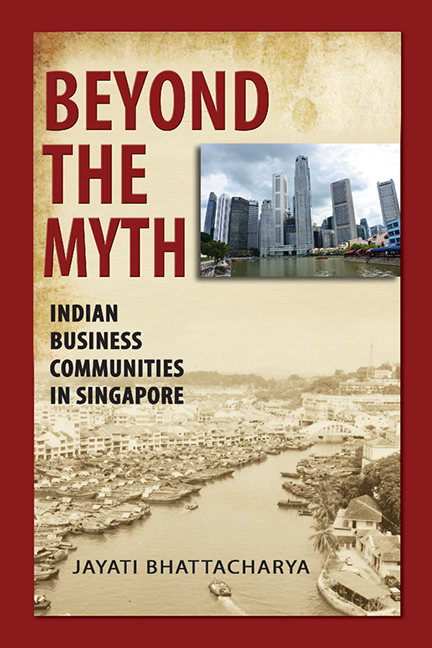Book contents
- Frontmatter
- Dedication
- Contents
- List of Map, Tables and Figures
- Message by Mr R. Narayanmohan
- Foreword by Professor Tan Tai Yong
- Message by Ambassador K. Kesavapany
- Acknowledgements
- List of Abbreviations
- Introduction
- PART ONE
- PART TWO
- Chapter Four Business Associations and Organizational Networks
- Chapter Five The Indomitable Entrepreneurs: Three Case Studies
- Conclusion: Surging Forward
- Appendices
- Select Bibliography
- Index
- About the Author
Chapter Five - The Indomitable Entrepreneurs: Three Case Studies
from PART TWO
Published online by Cambridge University Press: 21 October 2015
- Frontmatter
- Dedication
- Contents
- List of Map, Tables and Figures
- Message by Mr R. Narayanmohan
- Foreword by Professor Tan Tai Yong
- Message by Ambassador K. Kesavapany
- Acknowledgements
- List of Abbreviations
- Introduction
- PART ONE
- PART TWO
- Chapter Four Business Associations and Organizational Networks
- Chapter Five The Indomitable Entrepreneurs: Three Case Studies
- Conclusion: Surging Forward
- Appendices
- Select Bibliography
- Index
- About the Author
Summary
The Indian diasporic business communities as we have seen, have traversed through the lengths of Singapore's history through different phases of triumphs and disappointments, achievements and failures. The emerging pattern that has been witnessed through the entry and exit of different business entities at different phases of history is one that is diverse enough to accommodate almost all sectors of enterprises that exist in Singapore. The success stories of different generations have had also imbibed the spree of globalization in different parameters that was partly inherent, partly catalysed by the constraints of the size of the domestic market of Singapore. This chapter deals with three different cases studies, rooted in different phases of Singapore's history (the different periods have been discussed earlier), and have continued to be prominent names in the contemporary business landscape of the nation with unique dynamics of their own. In fact, at present they all rank among the top enterprises of Singapore. They represent the diversity of ethnic Indian entrepreneurial talent and strong historic presence in this geographical terrain with a continuity that has been witnessed in the changes of business paradigms and environment affecting the whole community.
Ethnic Indian business firms have had existed in different shapes and sizes at different periods of time, and a generic representation of the magnitude of success and achievements of the entire community is indeed difficult. The three enterprises mentioned in this chapter — the Kewalram Chanrai Group, Mustafa and Chemoil are not only amongst the biggest names in Singapore at present, but also rank among the top forty companies in the Forbes list. Such examples would help to affirm the visibility and prominence of the community among the overlooming presence of the large Chinese business networks in Southeast Asia. It also asserts the incorporation of diversification, professionalism and corporatization of business entities and a successful and smooth transition of the conventional family business network patterns in the changing rhetoric.
Two of the three enterprises mentioned in this chapter were associated with trading at some point of their growth, a sector that the ethnic Indians have been most adept in different phases of history as well as contemporary times. The other business concern represents the retail business sector, which had existed in Singapore, targeting the Indian clientele mostly in a rather domesticated market scenario.
- Type
- Chapter
- Information
- Beyond the MythIndian Business Communities in Singapore, pp. 255 - 301Publisher: ISEAS–Yusof Ishak InstitutePrint publication year: 2011

